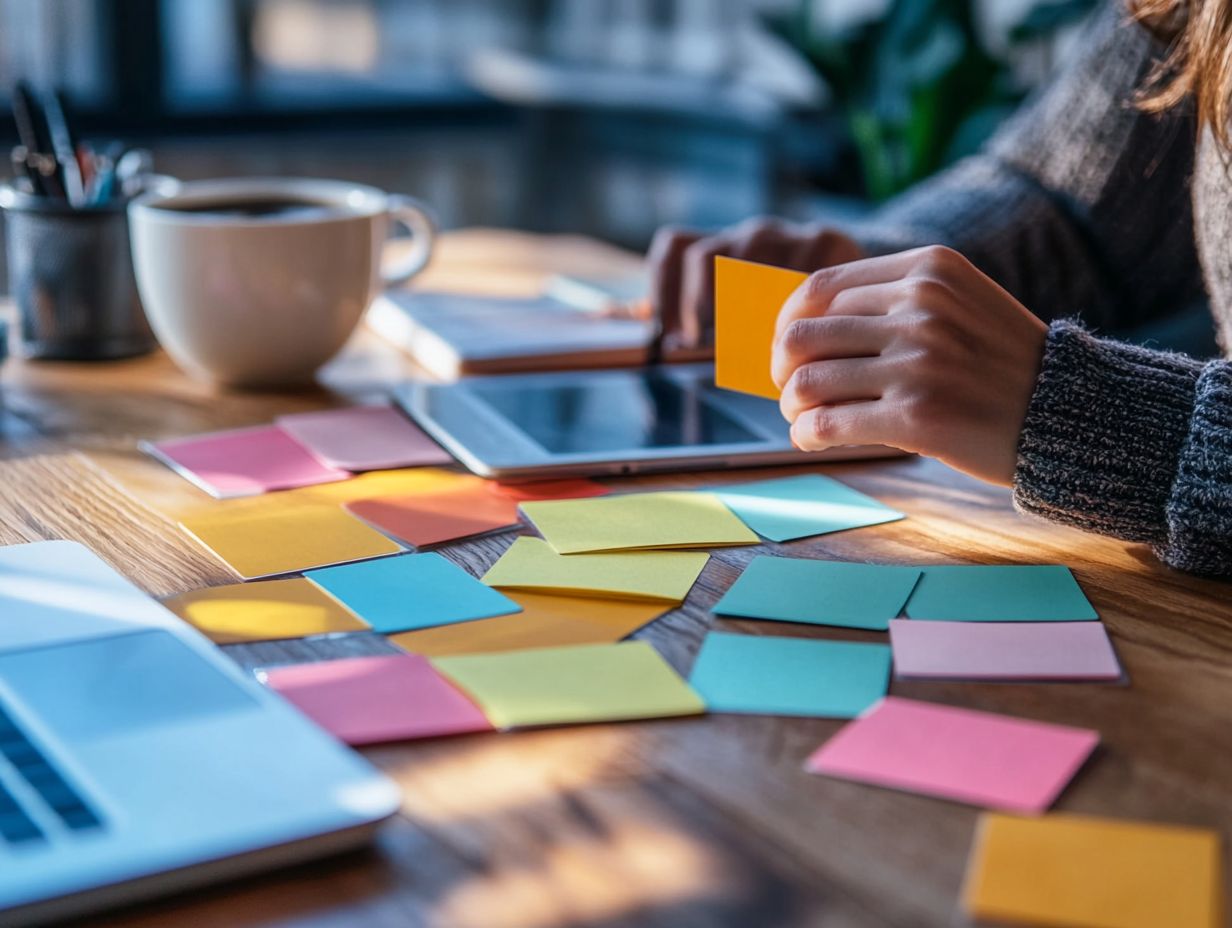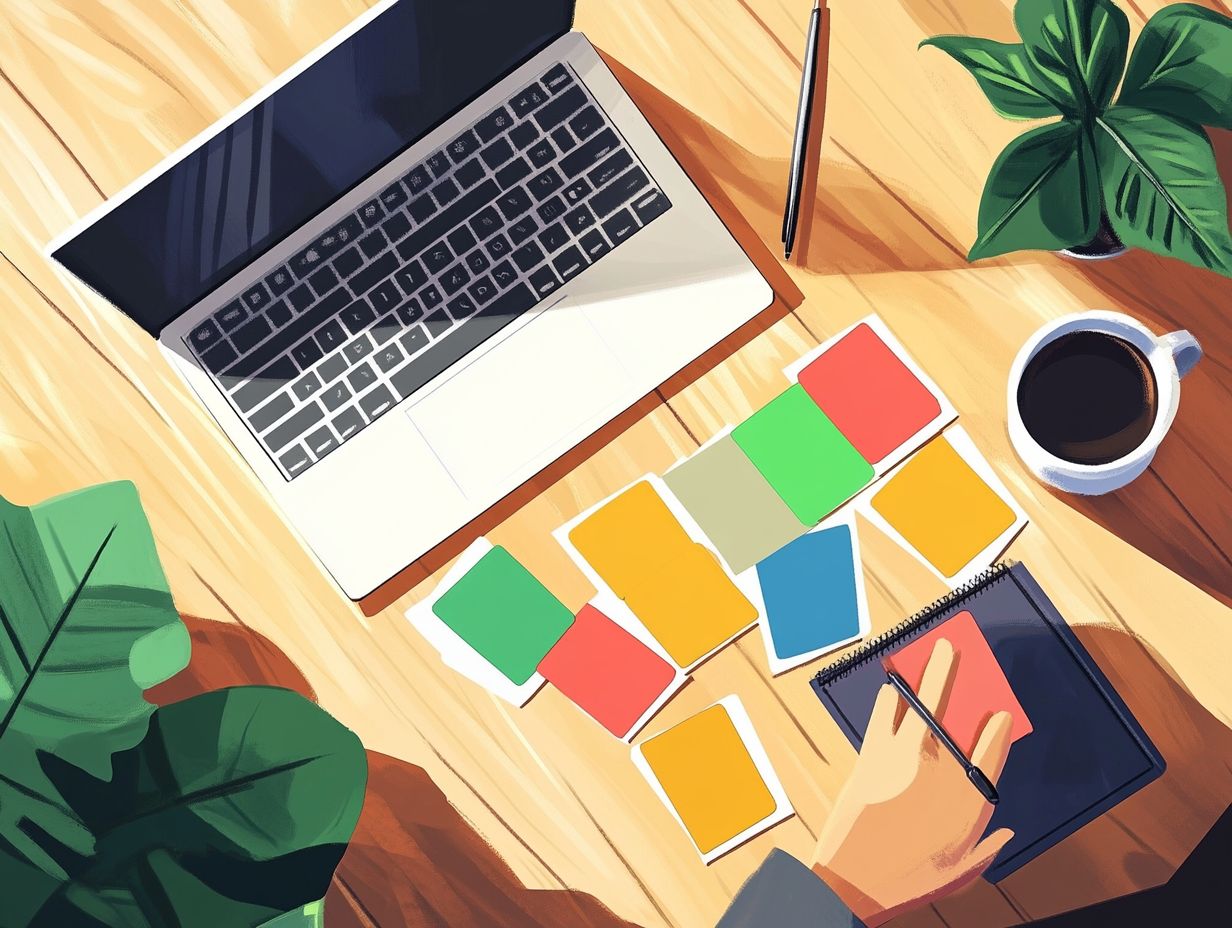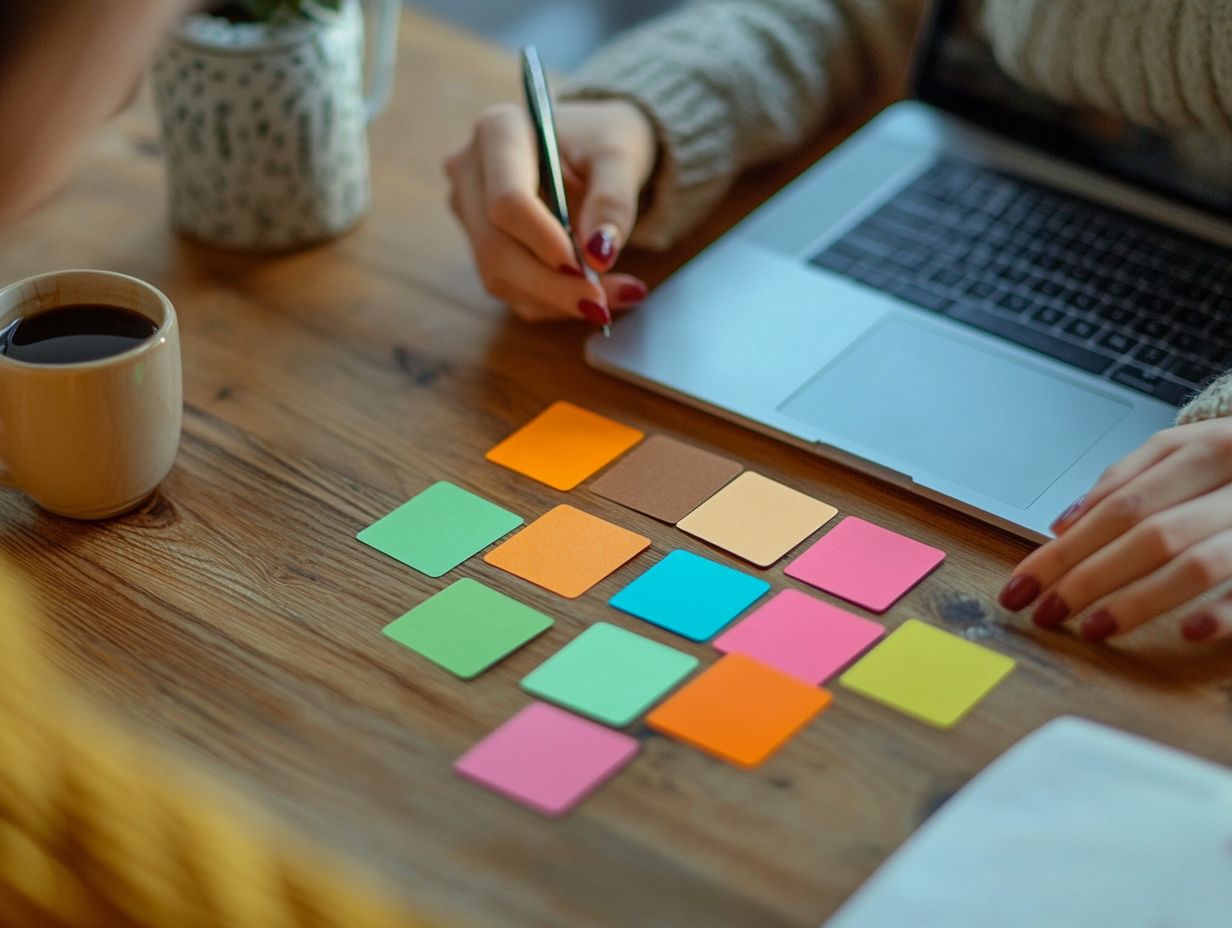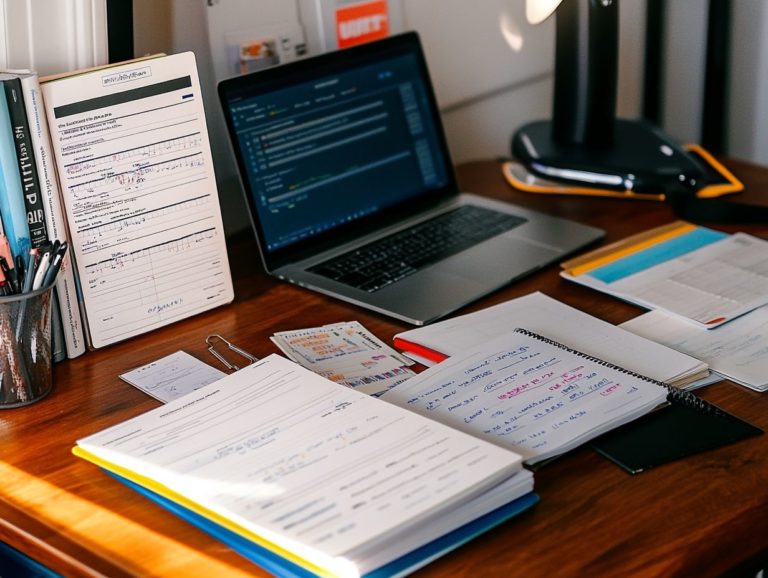how to use flashcards effectively in test prep?
Flashcards have become an invaluable asset in your test preparation toolkit. They provide a dynamic means to engage with material and elevate your learning experience.
Let s discover how flashcards can supercharge your study sessions! This article explains what flashcards are and how they enhance your retention and recall abilities. You will find numerous benefits of using flashcards, insightful tips for creating effective ones, and strategies for seamlessly incorporating them into your study routine.
Whether you re a visual learner or someone who thrives on a hands-on approach, you’ll discover techniques designed to maximize the effectiveness of flashcards in your test preparation journey.
Contents
- Key Takeaways:
- Understanding Flashcards in Test Preparation
- The Benefits of Using Flashcards
- Creating Effective Flashcards
- Incorporating Flashcards into Your Study Routine
- Tips for Maximizing the Effectiveness of Flashcards
- Frequently Asked Questions
- What are flashcards and why are they useful for test prep?
- How can I make flashcards more effective for test prep?
- Is it better to handwrite or use online flashcards?
- How should I approach using flashcards during my test prep?
- What should I do if I am struggling with certain flashcards?
- How can I use flashcards to study for different types of tests?
Key Takeaways:

- Flashcards are a powerful study tool that can improve retention and recall of information.
- Effective flashcards should be carefully designed and organized with the right information to maximize their benefits.
- Incorporating flashcards into a consistent study routine and using them alongside other methods can lead to successful test preparation.
Understanding Flashcards in Test Preparation
Flashcards are an essential tool in your test preparation. They can significantly elevate your learning experience and enhance memory retention, especially when using the best flashcard apps for test preparation.
These versatile learning aids pair questions with answers or definitions with concepts on compact cards. They enable you to engage in active recall, which is vital for effective revision.
Using flashcards also integrates smoothly with various learning techniques, promoting a deeper understanding and mastery of content over time.
By incorporating flashcards into your study routine, you can maximize your revision efforts, paving the way for improved academic performance in your exams.
What are Flashcards and How Do They Work?
Flashcards are powerful educational tools made up of small cards that feature questions on one side and answers or definitions on the other. They enhance your memory and learning retention through a technique known as active recall, which means you actively retrieve information from your memory.
This approach reinforces neural connections and boosts retention rates. When you use flashcards to memorize vocabulary or complex concepts, you engage in a process that leverages cognitive science principles, like the idea that pictures help us remember things better than just words.
This strategy also aligns with the Forgetting Curve, which highlights the importance of revisiting material at spaced intervals to avoid forgetting. By consistently practicing with flashcards, you solidify your understanding and build a stronger knowledge base, allowing you to engage in higher-order thinking and application.
The Benefits of Using Flashcards
The advantages of utilizing flashcards go beyond simple memorization. They can enhance your retention and recall, making them essential for optimizing your study sessions and fostering active learning.
For students, these tools truly elevate the educational experience.
Improved Retention and Recall
Flashcards can dramatically boost your memory and recall, thanks to the power of spaced repetition. This technique helps transfer information from short-term to long-term memory.
This innovative strategy works on the principle that information is retained more effectively when revisited at spaced intervals. For example, you might study vocabulary for language exams by revisiting tricky words at increasing intervals, solidifying your understanding.
Research shows spaced repetition boosts scores. Students using this method often achieve higher test scores compared to those who rely solely on last-minute cramming.
By consistently revisiting the material, you can forge stronger neural connections, making recall easier and more reliable during those critical assessments.
Start your flashcard journey today and watch your grades soar!
Efficient Study Time

Flashcards elevate your study sessions by encouraging active engagement. They help you connect with the material in a meaningful way.
Set specific time slots to review flashcards and summarize key concepts. Focusing on one topic at a time ensures clarity and conciseness.
Use color-coded cards to categorize subjects or difficulty levels. This approach streamlines your study process and highlights areas needing attention.
Incorporating spaced repetition techniques boosts retention. It allows you to revisit challenging concepts systematically over time.
Creating Effective Flashcards
Creating effective flashcards involves choosing the right information and designing them clearly. This thoughtful approach maximizes your study efforts.
Choosing the Right Information
Choosing essential information for your flashcards is vital. Focus on key terms and concepts that aid learning and memory retention.
One approach is to categorize information by relevance to core subjects. This ensures alignment with your educational goals.
Prioritize high-yield concepts to focus on material likely to appear in assessments. Concentrate on understanding complex ideas.
Limit each flashcard to one main idea or definition to avoid information overload. This makes active recall easier.
Regularly revisiting and revising card content can enhance retention and help integrate new knowledge.
Designing and Organizing Flashcards
Designing and organizing flashcards effectively enhances both visual appeal and cognitive engagement. Clear, legible fonts reduce cognitive strain.
Choose a contrasting color palette to distinguish concepts and make cards memorable. Group related topics under headings or bullet points for better organization.
Strive for a balance between aesthetics and functionality. A visually appealing design should never compromise clarity.
Incorporating Flashcards into Your Study Routine
Incorporating flashcards into your study routine can revolutionize your learning approach. This method encourages active engagement and boosts retention.
Strategies for Using Flashcards Effectively

Effective strategies can enhance your learning experience with flashcards. Techniques like active recall test your memory without immediately checking answers.
After reviewing a set of cards, close your eyes and try to recite the information before flipping the card. This reinforces your learning.
Spaced repetition increases retention by scheduling reviews at longer intervals. Try revisiting cards after one day, then three days, and finally a week.
Utilize the Pictorial Superiority Effect by adding relevant images. Pairing terms with diagrams boosts understanding and enriches your learning experience.
Integrating Flashcards with Other Study Methods
Integrating flashcards with other study methods creates a powerful combination that elevates your learning outcomes and supports a comprehensive revision strategy.
Pairing flashcards with techniques like summarizing notes, tackling practice problems, and using digital platforms such as Quizlet and Brainscape transforms your study sessions into dynamic learning experiences.
This combination reinforces memory retention and encourages active engagement with the material. For instance, summarizing your notes clarifies complex concepts, while practice problems test your application skills, ensuring that knowledge is not just memorized but truly understood.
Digital resources further enhance this process by offering interactive features and diverse content, making study sessions efficient and enjoyable.
Ultimately, embracing a diversified approach to studying boosts your confidence and fosters a deeper understanding of the subject matter.
Tips for Maximizing the Effectiveness of Flashcards
To maximize the effectiveness of your flashcards, consistent practice and review are essential. By incorporating the best study techniques for test prep, you can elevate their impact on your learning journey.
Consistent Practice and Review
Regular practice with flashcards supercharges your learning and memory! Establish a review schedule that incorporates spaced repetition to maximize efficiency and structure your time effectively.
Start by reviewing new flashcard sets daily during the initial learning phase. Gradually extend the intervals between reviews perhaps moving to every other day and then weekly as you become more familiar with the material.
Tracking your progress is crucial; consider using a simple spreadsheet or an app that highlights challenging cards to focus on areas needing improvement.
Maintaining motivation is also key. Pair your flashcard reviews with rewards, like treating yourself to a favorite snack or allowing for a brief break after completing a session, to make studying more engaging.
Utilizing Different Learning Styles
Using various learning styles when employing flashcards can significantly enhance your comprehension and retention while catering to your individual preferences.
If you re a visual learner, incorporate images or color coding into your flashcards for a more engaging experience. If you thrive on auditory learning, read the flashcards out loud or use auditory cues like repeating phrases.
For kinesthetic learners, incorporating movement can be beneficial try writing out your flashcards or using physical objects to represent concepts.
By adapting flashcards in these ways, you better support your diverse learning needs, ensuring you fully grasp and retain the material presented.
Frequently Asked Questions
What are flashcards and why are they useful for test prep?
Flashcards are small cards containing information on one side, typically a question or term, and the corresponding answer on the other. They are useful for test prep because they allow for active recall and repetition of information, aiding in retention and understanding.
How can I make flashcards more effective for test prep?
Use your flashcards regularly for the best results. Organizing them by topic can be helpful, and creating a mix of different question types like multiple choice and fill in the blank challenges you further. For more tips on how to use flashcards for quick review, consider incorporating varied techniques into your study routine.
Is it better to handwrite or use online flashcards?
Handwriting and using online flashcards can both be effective. It ultimately depends on personal preference. Writing out flashcards by hand aids memory and retention, while online flashcards offer convenience and easy modifications.
Start your flashcard journey today and transform your study sessions!
How should I approach using flashcards during my test prep?
Using flashcards can be a game changer for your test prep! To maximize their effectiveness, check out this guide on how to use flashcards for test prep and have a clear plan in place before you start.
Decide how many flashcards to review each day or week. Consistency is key, so stick to your schedule.
Focus on one topic or section at a time. This helps to prevent feeling overwhelmed.
What should I do if I am struggling with certain flashcards?
If some flashcards are challenging, break them down into smaller parts. You can also use memory aids to help you remember.
Consider asking a friend or study partner to quiz you. If needed, seek help from a tutor or teacher for extra support.
How can I use flashcards to study for different types of tests?
Flashcards are versatile and can help you prepare for multiple choice, fill-in-the-blank, and essay exams.
For multiple choice tests, create flashcards with questions and answer choices. For fill-in-the-blank exams, leave a space for the answer.
For essay exams, use flashcards to review key terms and concepts to include in your essays.







